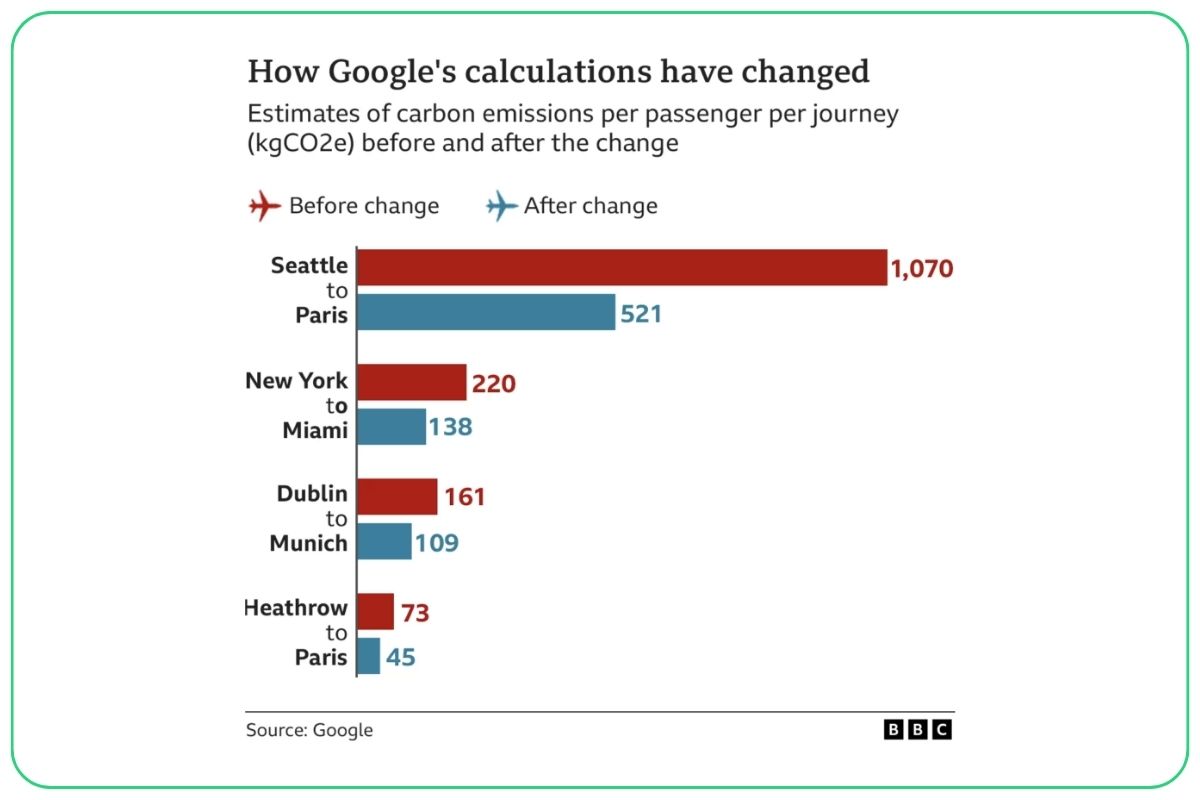In case you missed it (because we nearly did!) In July, Google quietly altered the way it calculates the environmental impact of flights.
Previously their carbon footprints included all the extra stuff a plane pumps out, known as the ‘carbon dioxide equivalents’, these measurements include the contrails of nitrous oxides and water vapour, which trap further heat in the atmosphere when emitted at high altitude.
But now, Google are provisionally removing the effects of contrails from their estimations, in an attempt to provide consumers with ‘the most accurate information’ – let’s delve deeper.

But why?
To put the impact of this into context, aviation is responsible for 3.5% of global emissions. But if we apply Google’s new calculations, this figure looks more like 2%. (This 1.5% difference is roughly the total annual emissions of the United Kingdom!)
So how will this affect us?
With Google hosting 9 out of every 10 online searches, you bet that this change will affect our travel choices!
Of course, how we compare flights with other flights won’t really change… but making flights seem greener than they are will have a huge impact on whether we choose to fly over taking the train. Google claims their emissions estimates ‘help you make more sustainable travel choices’ but many experts, like Dr Doug Parr, chief scientist of Greenpeace, agree that changing calculations will have the opposite affect, giving consumers ‘approximately half’ of the picture… sneaky, right?
And how will this affect business?
This is set against a backdrop of incoming UK and EU legislation, requiring certain companies (and subsequently their supply chains) to report on their carbon emissions.
Companies will want to know that the data they’re capturing is accurate, consistent with the status quo, and in line with current guidance!
At TripShift, all our UK numbers are provided by The Department for Business, Energy & Industrial Strategy (BEIS) and are updated yearly in June.
The UK Government advises that although they can be ‘subject to significant uncertainty’, it is important that all organisations include non-CO2 emissions in their reporting to ‘capture the full climate impact of their travel.’
At TripShift we agree… leaving a bit of margin for error never hurt anybody!
No matter what numbers your business decides to use, the most important thing to do is ensure they are consistent. Businesses should avoid reporting non-CO2 emissions one year and direct effects another year – as this really fudges the numbers! Comparable reporting is essential to prevent greenwashing.
So, what about all the businesses reliant on Google’s carbon calculations for their ESG reporting? Their methodology is widely recognised as the industry standard in aviation after all…
Well, they are suddenly seeing their figures impacted in an unexpectedly positive way! So, what do they do?
Recalculate their baseline? Re-evaluate their business travel targets? All for the extra emissions to be re-instated when google finds more accurate non-CO2 emissions calculations? I dread to think how long this would take…
Or they could switch to a more reliable way of accounting for their business travel emissions, automatically, using TripShift.
Imagine a platform that collects travel data in real-time through your teams’ mobile devices, creates a targeted reduction strategy, automatically updates carbon metrics as and when they are adjusted (by BEIS!) and subsequently adjusts business travel targets, baselines and strategy accordingly – all without need for manual input.
Accuracy over responsibility?
Do corporates sometimes justify a delayed action because they are missing accurate data?
We have seen it time and time again with Scope 3 emissions, which are often poorly reported on due to the difficulties surrounding data collection.
But, now there is another way…. TripShift facilities easy data collection and accurate, up-to-date reporting.
Responsible business is not about ‘airbrushing’ out emissions because google said its ok… it’s about investing in long-term carbon accounting solutions which free up resources and future-proof your climate transition plans.
Want to learn about TripShift? Get in touch today.
#MoveBetter



